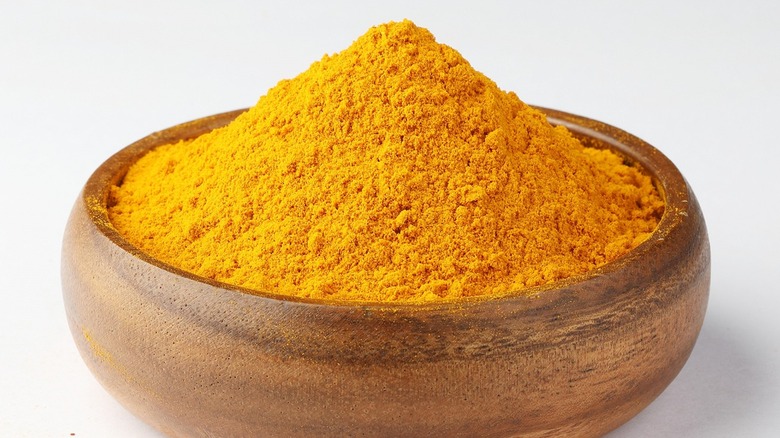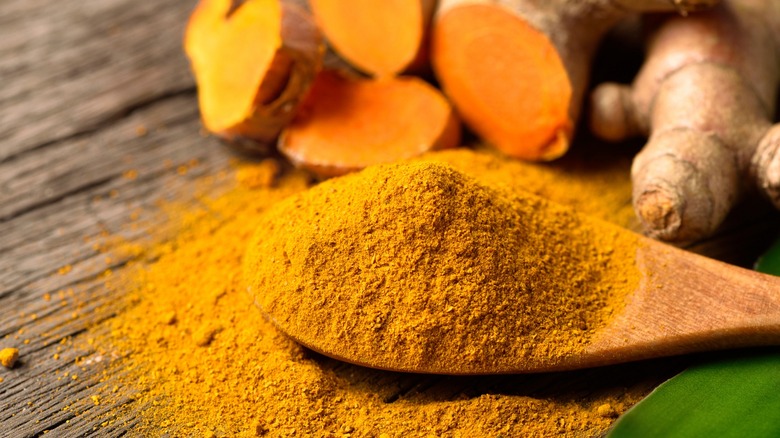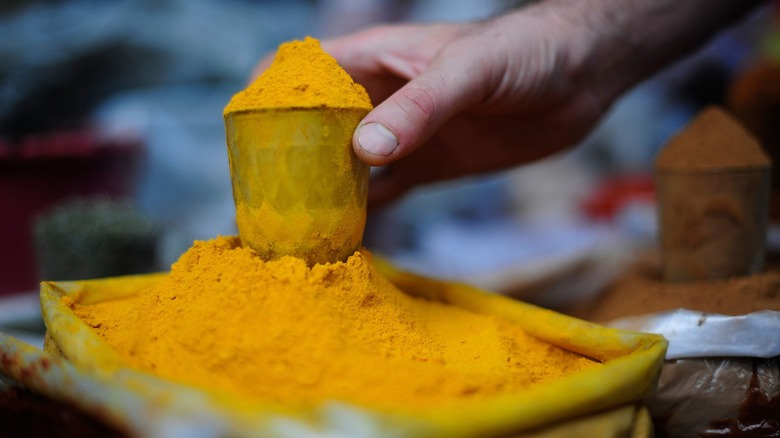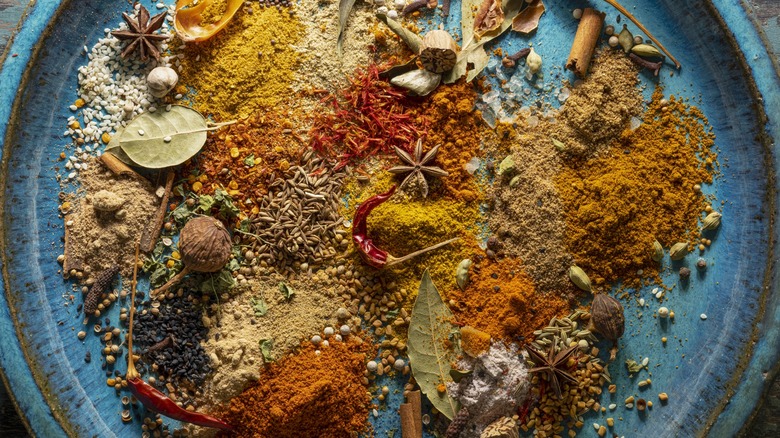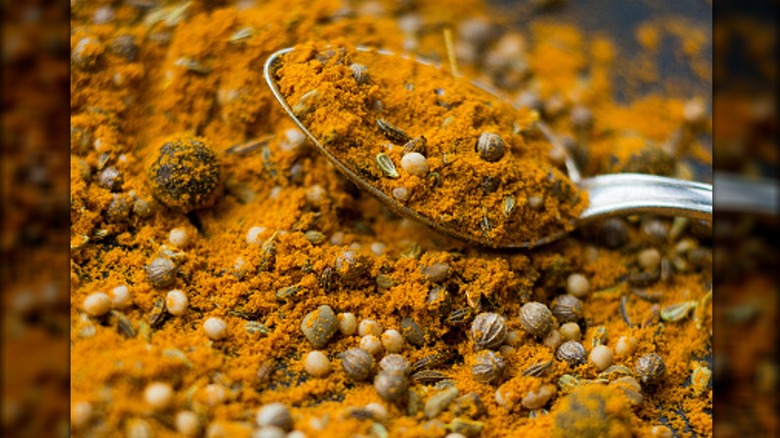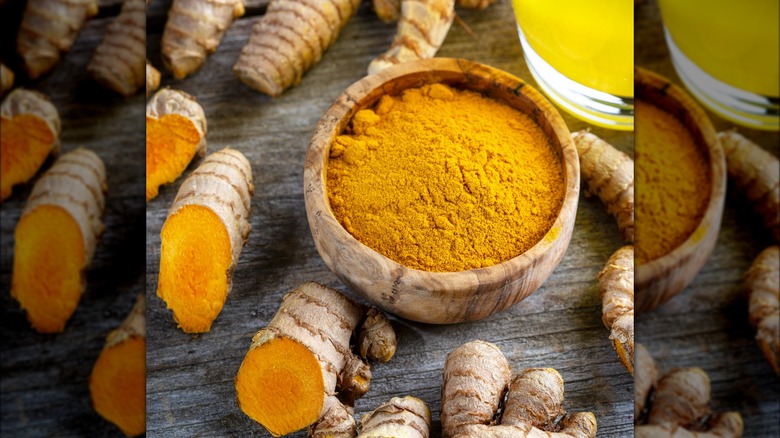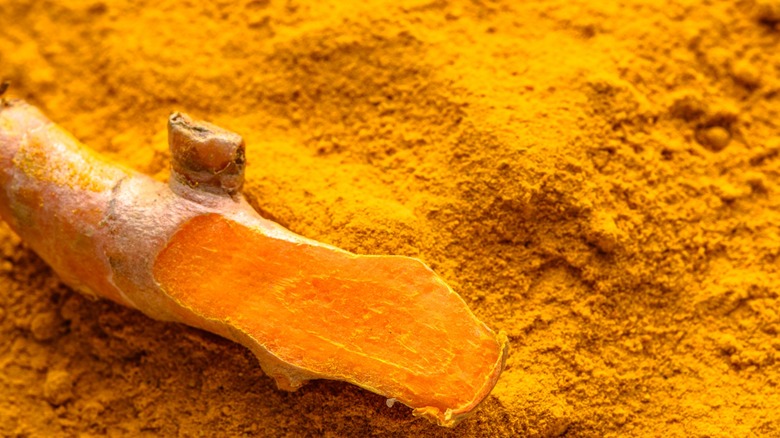What Makes Jamaican Curry Powder Unique?
Curry is a staple on restaurant menus all over the world. No matter what country you're in, there's a good chance you can find someone selling curry. But what is curry powder, and what does it taste like? If you ask multiple people, you'll probably hear something different from each of them. This is because curry powder is typically a mixture of spices and can vary from culture to culture. The term "curry" was used by colonizers as a way to generalize flavors they weren't familiar with, particularly in Indian food. The bright orange-hued curry powder we typically see in grocery store spice sections, which consists of turmeric, cumin, ginger, and black pepper, is widely associated with Indian cuisine. However, one curry powder you're less likely to encounter at your everyday grocery spot comes from Jamaica.
Jamaican curry powder contains some of the same ingredients as the regular curry powder. However, some added flavors give it a Caribbean flair. Like other curry powders, it has several applications in your kitchen, from flavoring soups and stews to meats to sauces.
What is Jamaican curry powder?
Curry powder packs a flavorful punch — and the Jamaican variety is no exception. Jamaican curry powder differentiates itself from other curry powders with several distinct flavors. For example, allspice gets incorporated into a mixture of turmeric, cumin, and coriander. Other spices, like star anise and scotch bonnet pepper, are occasionally thrown into the mix.
The Allspice tree is native to the Caribbean and is featured in many Jamaican dishes, so much so that some people refer to this spice as the "Jamaican pepper." This small berry grows on a tree and imparts a flavor profile similar to nutmeg, cloves, and cinnamon. For this reason, they can often substituted for one another. Allspice adds an element of warmth to Jamaican curry powder that is sometimes compounded by ground-up star anise. This delicate, star-shaped spice has a licorice-like flavor with a slight sweetness. Both of these spices are known to enhance sweet and savory dishes, making Jamaican curry an incredibly versatile seasoning blend.
How to make Jamaican curry powder
Because the term curry represents a blend of any number of spices, you'll need to gather several ingredients before you get started on making Jamaican curry powder. This might require a trip to the store if you don't have a stocked stash of coriander seeds or turmeric in your pantry.
Once you've got everything ready to go, measure out your spices according to your recipe or based on your preferences. For best results, the spices should toast in a skillet until they become darkened and fragrant, which takes about 10 minutes. The process of heating the different elements reduces the moisture content and makes a more uniform texture once you grind them. The final step is loading up your spice grinder or coffee grinder with the cooked spices and breaking them down into a powder.
There are many benefits to making spice blends at home, aside from the heavenly aroma that fills your house. Store-bought spice mixes have a shorter shelf life than what you can make at home. Even better, homemade blends tend to have a more potent flavor and fewer fillers and additives.
Jamaican curry powder vs. Indian curry powder
A bowl of curry is well-loved worldwide, but these dishes vary greatly based on the region and tastes of the local population. Indian curry powder, or Madras curry powder, was invented by the British to replicate flavors they found in India.
Eating this more commonly found curry powder is an entirely different experience from eating Jamaican curry powder. The Indian blend typically includes some hot pepper varietal to deliver heat that you won't find in its Jamaican cousin. The other main difference is the addition of allspice in the Jamaican version. Other traditional Jamaican foods contain allspice — anything flavored with jerk seasoning, for example — making it a flavor that represents this culture. Also, since Jamaican curry powder typically has more turmeric and less chili pepper flavor than its Indian alternative, it can be less spicy than Madras curry powder.
Despite their different flavor profiles, these seasoning blends have similar applications. They're commonly used to flavor meats like short ribs, chicken, or beef. Here's how to substitute for curry powder. If you have Jamaican curry powder on hand, and your recipe calls for Madras curry powder, you'll need to add a spicy element, like hot peppers. Alternatively, you'll want to add allspice and turmeric to regular curry powder when making a dish calling for Jamaican curry powder to impart its signature flavor.
How to cook with Jamaican curry powder
Jamaica has a rich and complex culinary scene, embracing flavors from across the Indian Ocean and the Caribbean. It's known for flavorful sauces featuring seasonal produce and various proteins, including fish, chicken, or beef.
You'll find that many of these dishes are flavored with Jamaican curry powder. Jamaican curry chicken showcases this seasoning with its bold flavor and intense yellow color. Jamaican oxtail stew also contains this signature curry powder and extra allspice to bring out the classic island flair. While Jamaican curry powder is a primary seasoning in many soups and stews, you aren't necessarily relegated to standing over a pot if you want to experiment with these spices. You can also use Jamaican curry powder as a rub for meat before popping it on the grill or sprinkle it on vegetables to jazz them up before going in the oven.
How much curry powder you use in your cooking will vary depending on what dish is in the works. When working with curry powder as a spice rub, start with 2 teaspoons per pound of meat or vegetables. In a curry stew or soup, try 1 teaspoon per pound of meat or veggies, up to a couple of tablespoons. Taste as you go!
Where to buy Jamaican curry powder
To harness the flavors of Jamaican cuisine, you'll likely want to get your hands on some Jamaican curry powder. If you're traveling in Jamaica, you won't have a problem tracking it down or finding the ingredients to make your own at a supermarket. In the United States, however, you'll likely have to locate a globally-themed grocery store.
If that's not an option, your best bet for purchasing Jamaican curry powder is to go online and find one that looks like it has the blend of spices you desire. You'll find any number of flavors and mixtures. On Amazon, you'll see options retailing for just over $1 an ounce. If you get lucky, you might stumble upon Jamaican curry powder at grocery stores, such as Walmart (sold in a 2-pack for $25.99). However, if all else fails, you can fill your house with the scent of spices toasting while you make homemade curry powder.
Nutritional benefits of Jamaican curry powder
There's nothing better than learning that something flavorful and delicious is just as nutritious. Jamaican curry powder is one of those foods. It's chock full of flavor and simultaneously is loaded with nutritional benefits. Because curry powders typically contain turmeric, they lend a bright orange hue to everything they are used to create.
Jamaican curry powder contains many of the same ingredients as Madras curry powder, so the benefits of eating both are similar. According to Healthline, turmeric and coriander are powerful ingredients well-known to help with inflammation. Studies published in Nutrition Journal have shown that eating curry powder regularly can improve your heart health. Other studies indicate that it can fend off cancer cells. On a more day-to-day level, eating Jamaican curry powder can improve your digestion and lower blood sugar. Some experts say eating it can help maintain brain health and prevent Alzheimer's disease.
Jamaican curry powder features a different flavor profile from the curry powders most people are used to seeing in stores while delivering the equivalent nutritional value. Ultimately, this seasoning is a great way to try something new, especially if you're a curry fan.
